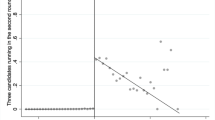Abstract
Scholarship on how particular electoral arrangements influence vote choice, turnout, coalition behavior, and government policy has received renewed attention with the emergence of so many democracies in the last two decades. The French case is particularly noteworthy because national elections normally require two ballots in order for winners to secure a majority of the votes, and also due to the prevalence of French-style presidential contests implemented in several new democracies (e.g., Bulgaria, Poland, Romania, Russia, and Ukraine). The overriding research question of this chapter is the impact of the double ballot. We depart from the observational paradigm of previous research, using laboratory experiments to distinguish how double ballot electoral systems differ from single ballot systems on several outcome variables: effective number of candidates, sincere voting, accurate forecasters, party ideological distance, voter ideological distance, and candidate ideological distance. The results of the experiments, conducted in the United States, suggest that double ballot rules produce statistically different results from single ballot rules. In principle, these results would appear to be applicable cross-culturally and may have important implications for presidential reform in both the United States and the France.
Access this chapter
Tax calculation will be finalised at checkout
Purchases are for personal use only
Similar content being viewed by others
Notes
- 1.
Several scholars add mixed electoral systems to this list, which include a combination of PR rules with either plurality or majority formulas (Bawn 1993; Blais and Massicotte 2002; Jesse 1988; Moser 2001). The general consensus is that mixed systems tend to behave like PR because of the tendency to drive up the number of parties, suggesting less strategic behavior on behalf of voters.
- 2.
However, he concedes it is more difficult to characterize the double ballot effects.
- 3.
The students received candy and office supplies to compensate for their time.
- 4.
Refer to Appendix for the experiment materials.
- 5.
The subjects were asked to fill out a background questionnaire prior to the experiment. The results were correlated with the group type to test the degree linear dependence between group type and the demographic and/or the political ideology variables. The correlation matrix did not reveal a significant relationship between group placement and the questionnaire.
- 6.
However, the results of two pilot experiments conducted in June and September 2006 also found null results for the number of viable candidates.
Author information
Authors and Affiliations
Corresponding author
Editor information
Editors and Affiliations
Rights and permissions
Copyright information
© 2011 Springer Science+Business Media, LLC
About this chapter
Cite this chapter
Wittrock, J., Lewis-Beck, M.S. (2011). French Double Ballot Effects: American Experiments. In: Dolez, B., Grofman, B., Laurent, A. (eds) In Situ and Laboratory Experiments on Electoral Law Reform. Studies in Public Choice, vol 25. Springer, New York, NY. https://doi.org/10.1007/978-1-4419-7539-3_7
Download citation
DOI: https://doi.org/10.1007/978-1-4419-7539-3_7
Published:
Publisher Name: Springer, New York, NY
Print ISBN: 978-1-4419-7538-6
Online ISBN: 978-1-4419-7539-3
eBook Packages: Humanities, Social Sciences and LawPolitical Science and International Studies (R0)



